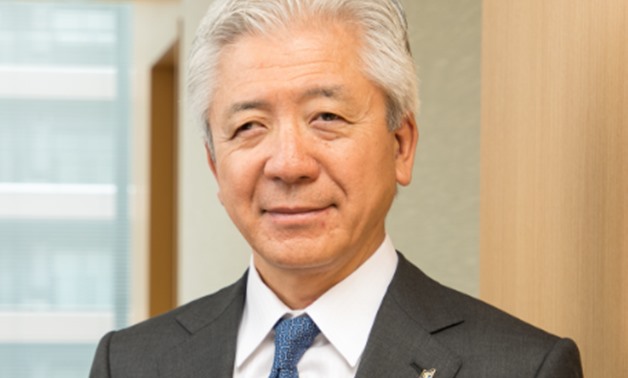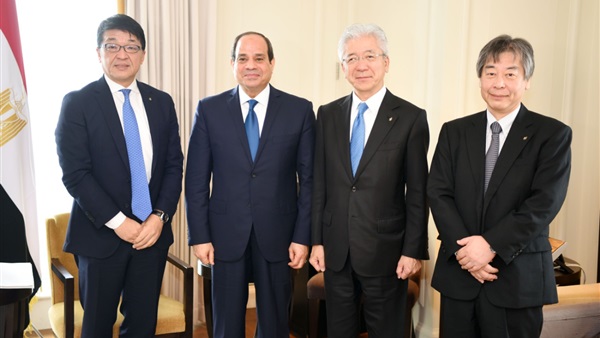
President and Chief Executive Officer of Toyota Tsusho Mr. Ichiro Kashitani - Photo courtesy of Toyota Tsusho
CAIRO - 21 September 2019: Being the trading arm of Toyota group, one of the largest Japanese companies, Toyota Tsusho Corporation seeks to expanding investments in Egypt’s areas of natural gas, power and automobile.
In June President Abdel Fatah al-Sisi stressed, during a meeting with Toyota Tsusho CEO, that Egypt possesses the necessary capabilities to represent a pivotal aspect for all Japanese industries, and could be their gateway into various markets in Africa, the Middle East and Europe, primarily for Japan’s car industry, capitalizing on the free trade area agreements Egypt shares with these countries.
Business Today Egypt conducted an email interview with President and Chief Executive Officer of Toyota Tsusho Mr. Ichiro Kashitani, who opened up on the corporation’s investments in Egypt over the past 10 years, and the corporation’s outlook on the automobile market in the North African country. Mr. Kashitani assumed the office of president and CEO in April 2018.

President Sisi during his meeting with President and Chief Executive Officer of Toyota Tsusho Mr. Ichiro Kashitani - Press photo
First, bt provides in the below lines a quick glimpse on the corporation:
What is Toyota Tsusho?
Established in 1948, it is a member of the Toyota Group, which comprises 17 companies, including the Toyota Motor. It is the group’s sole general trading company, which develops the business in seven operating divisions: Metals, Global Parts & Logistics, Automotive, Machinery, Energy & Project, Chemicals & Electronics, Food & Consumer Services, Africa.
Toyota Tsusho has two-fold business models, first is trading, which relies on providing information services, logistics, financing, risk management and other functions for import/export and domestic trading businesses. And the second is the business investment, where the company accelerates its investments in promising business fields and markets, in collaboration with their partners around the world.
bt: During your meeting with the Egyptian president Abdel Fatah al-Sisi in Osaka in June, you discussed your desire to expand your investments in Egypt in oil exploration and the automotive industry; could you please tell us about the opportunities you see in these fields?
Kashitani: In the past 10 years Toyota Tsusho Corporation (“TTC”) made investment in Egypt for the following three projects with total scale of USD 1 billion;
1) To own and operate 2 offshore natural gas development Jack up rigs
2) To conduct CKD production of Toyota vehicles
3) To build and operate 250 MW wind power station.
In Osaka meeting, we, TTC emphasized our strong interest in expanding investment in each of the foregoing areas in light of our expectation of the big potential growth in energy and automobile industries in Egypt.
bt: How do you see the future of the automobile market in Egypt?
Kashitani: In Egypt, Toyota brands, including Corolla and Hiace, have been popular for a long time, and Fortuner is locally produced for the growing SUV market globally. The automobile market in Egypt is the second largest market in Africa, behind South Africa, and we believe it has the potential to become a 300,000- unit market in the near future. We would like to introduce vehicles to the market which meet customer needs while seeking additional sales opportunities.
bt: Egypt is seeking to transform to electric cars, announcing it has introduced a number of electric buses in its transport system. Would you tap in the government’s plan to transform to electric vehicles, aiming to export to Arab, African and European markets?
Kashitani: Toyota Motor Corporation is promoting vehicle electrification with the aim of creating a sustainable mobility society. We will proceed to study the introduction of electrified vehicles in Egypt in line with customer’s needs in the future.
bt: After the Egyptian government has completely removed fuel subsidies in July, what do you think about the proposed plans to transfer fuel-powered cars to be powered with natural gas?
Kashitani: Based on the global trend to electrification, Toyota Motor Corporation has strategy of environmental technology which is based on the ideas of using diversified fuels. We continue to consider how to address this issue, depending on the needs of the regions, countries and their policies.
Meanwhile, in order to realize the fuel transfer plan by government, natural gas field development would be necessary to be accelerated and we are ready to support it by expansion of the offshore rig project as referred above.
bt: How do you see Egypt has supported Japanese investors, and what facilities/incentives do you think Egypt should provide to help expand your investments in the country?
Kashitani: The automobile industry has a wide range of businesses. We believe that the key support is not only for completed car manufacturers but also for auto part suppliers. On the other hand, tariffs on vehicles manufactured in Europe was abolished this year, which has an adverse effect on vehicles produced locally in Egypt. Nevertheless, we are looking forward to additional support from the Egyptian government in terms of nurturing automobile production domestically.
For energy sector, Japanese government is willing to support potential investment from Japan through its various institutes such as JBIC, JICA, NEXI, JOGMEC, etc. Egyptian government is kindly requested to flexibly react to requirements by them.
bt: What discussions of Toyota Tsusho participation in oil refining and petrochemicals fields result in?
Kashitani: As we understand immediate increase of local production of Gasoline and Diesel is vital to meet rapid demand in transportation sector, we have shown keen interest in supporting new refinery construction with financing. In accordance with Egyptian government request, we conducted pre-study under Japanese government financial aid and has been talking with Japanese partners of construction and financing. Since Osaka meeting, we have been waiting for further instruction from Egyptian government to move forward on fast track basis.
bt: Toyota Tsusho has been operating in Egypt since 1925, and it sees the country as its gateway to Africa. How do you think Egypt’s chairmanship of the African Union would help expand your work in Africa?
Kashitani: We appreciate President Sisi’s activity during TICAD 7 as AU Chairman. In turn, we, as Chairman of Japan - Egypt Business Council, are always promoting strategic position of Egypt for export basis for COMESA (or AfCFTA) and EU to Japanese companies. We have started export of Egyptian products to Kenya and other countries and wishes to do more.


Comments
Leave a Comment